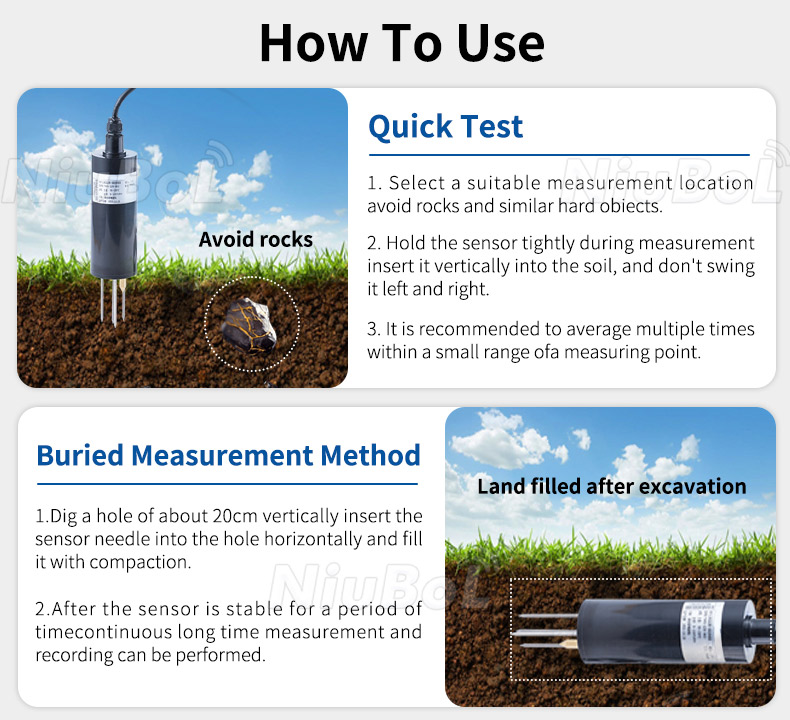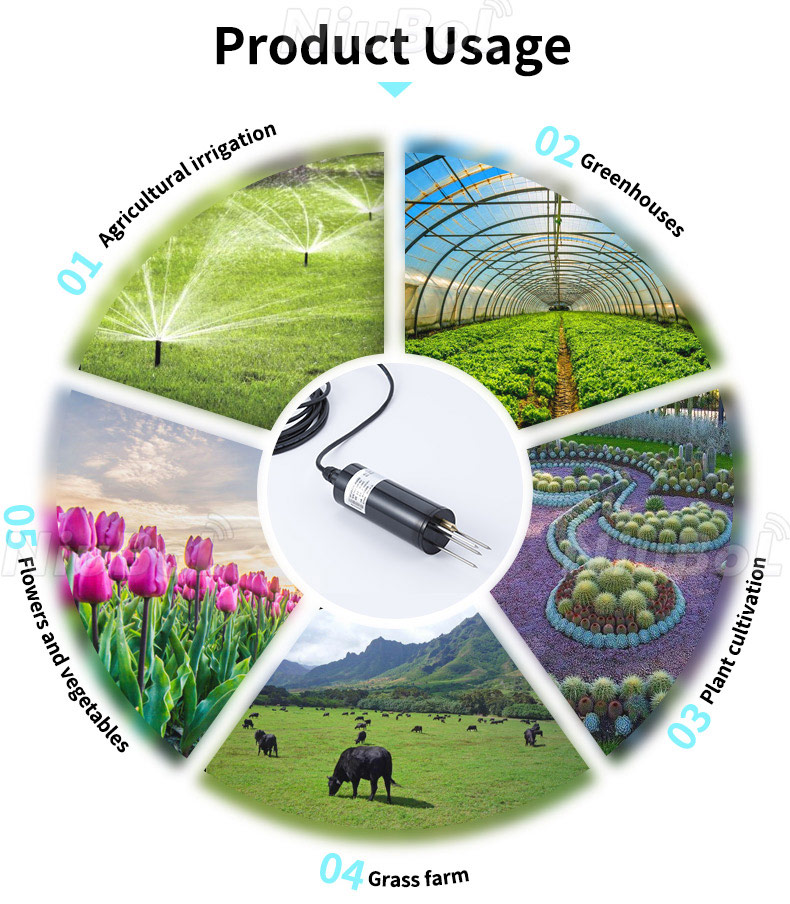

— Blogs —
—Products—
 Consumer hotline +8618073152920
Consumer hotline +8618073152920 WhatsApp:+8615367865107
Address:Room 102, District D, Houhu Industrial Park, Yuelu District, Changsha City, Hunan Province, China
Product knowledge
Time:2024-05-19 10:14:49 Popularity:745
The practice and exploration of soil moisture monitoring systems in precision agriculture is an important and growing field. Precision agriculture, also known as precision farming or fine farming, is a new type of agricultural production system based on information technology and modern agricultural technology, the goal of which is to maximize agricultural productivity and achieve sustainable development in terms of high quality, high yield, low consumption and environmental protection.
Soil moisture monitoring system as an important part of precision agriculture, its practice is mainly reflected in the following aspects:
1. Precision irrigation management: through the soil moisture monitoring system, farmers can understand the soil moisture condition in real time, and by combining with the irrigation system, they can precisely regulate the amount and frequency of irrigation water, so as to accurately control the time, frequency and amount of irrigation water. This kind of management can avoid over-irrigation or under-irrigation, save water resources, reduce environmental pollution, and also help to improve the yield and quality of crops.
2. Scientific fertilization decision-making: the soil moisture monitoring system can also be combined with the soil nutrient monitoring system to achieve precise fertilization. Farmers can more accurately determine the content and demand of various nutrients in the soil based on these data, so as to develop a scientific fertilization program. This kind of fertilization not only avoids the waste of fertilizer, but also ensures the nutrient supply of crops.
3. Pest and disease prevention: soil moisture has a close relationship with the occurrence of pests and diseases. Excessively wet or dry soil may cause certain pests and diseases. Through the soil moisture monitoring system, farmers can detect abnormal changes in soil moisture in time, take measures in advance to prevent the occurrence of pests and diseases, reduce the use of pesticides and protect the ecological environment.
4. Data-driven decision support: Soil moisture monitoring system can collect a large amount of soil moisture data and combine it with other agricultural data, such as meteorological data, crop growth data, etc., to build models and algorithms for analysis and prediction. These data and models can provide decision support to farmers, such as determining the best time to sow seeds, predicting crop growth trends, evaluating irrigation and fertilizer application effects, etc., helping farmers make more scientific and accurate decisions to improve the efficiency of agricultural production.

Below are some cases that demonstrate the practical effects of soil moisture monitoring systems and other related technologies in precision agriculture:
Case 1: Vineyard in California, USA
In a vineyard in California, USA, farmers use a soil moisture monitoring system to optimize irrigation. By monitoring soil moisture levels in real time, farmers were able to get an accurate picture of soil moisture conditions in different areas of the vineyard. This enabled them to irrigate precisely according to the situation and avoid over- or under-irrigation. The results showed that the use of the soil moisture monitoring system resulted in a 20% increase in water utilization in the vineyard, as well as an increase in the quality and yield of the grapes.
Case 2: Farmland in Israel
A farmland in Israel uses a soil moisture monitoring system and UAV remote sensing technology to monitor crop growth. With hyperspectral images collected by drones, farmers are able to visualize crop growth and water requirements. Combined with soil moisture data, they are able to precisely adjust irrigation and fertilization schedules. After implementing these technologies, the farm's water-use efficiency increased by 30 percent and crop yields increased by 15 percent.
Case 3: Rice-growing area in China
In a rice-growing area in China, farmers used soil moisture monitoring systems and weather stations to optimize irrigation and fertilization. By monitoring soil moisture and weather data in real time, farmers are able to know exactly what the rice needs to grow. Based on the data predictions, they were able to rationalize irrigation and fertilization and reduce the use of chemical fertilizers and pesticides. The results showed that the use of these technologies increased rice yields by 10 percent, while saving large amounts of water and reducing environmental pollution.
These cases show that the practical application of soil moisture monitoring systems and other related technologies in precision agriculture can significantly improve crop yields and quality, conserve water resources, reduce the use of chemical fertilizers and pesticides, and promote sustainable agricultural development.
Soil moisture monitoring systems can automatically adjust irrigation and fertilization programs to achieve automation and intelligence in precision agriculture. In addition, the system can be combined with other precision agriculture technologies, such as drone remote sensing technology and satellite remote sensing technology, to form a more comprehensive and three-dimensional monitoring system. Together, these technologies can provide data support for precision agriculture, help farmers better manage their farmland, and improve the efficiency and sustainability of agricultural production.

In conclusion, the practice and exploration of soil moisture monitoring systems in precision agriculture is an important and evolving field that can help farmers achieve precise irrigation management, optimize fertilization strategies, predict pest and disease risks, and data-driven decision support. With the continuous advancement of technology and the expansion of application scenarios, the practice and exploration of soil moisture monitoring systems in precision agriculture can improve crop yield and quality, reduce production costs, and promote the sustainable development of agriculture.
Related recommendations
Sensors & Weather Stations Catalog
Agriculture Sensors and Weather Stations Catalog-NiuBoL.pdf
Weather Stations Catalog-NiuBoL.pdf
Related products
 Combined air temperature and relative humidity sensor
Combined air temperature and relative humidity sensor Soil Moisture Temperature sensor for irrigation
Soil Moisture Temperature sensor for irrigation Soil pH sensor RS485 soil Testing instrument soil ph meter for agriculture
Soil pH sensor RS485 soil Testing instrument soil ph meter for agriculture Wind Speed sensor Output Modbus/RS485/Analog/0-5V/4-20mA
Wind Speed sensor Output Modbus/RS485/Analog/0-5V/4-20mA Tipping bucket rain gauge for weather monitoring auto rainfall sensor RS485/Outdoor/stainless steel
Tipping bucket rain gauge for weather monitoring auto rainfall sensor RS485/Outdoor/stainless steel Pyranometer Solar Radiation Sensor 4-20mA/RS485
Pyranometer Solar Radiation Sensor 4-20mA/RS485
Screenshot, WhatsApp to identify the QR code
WhatsApp number:+8615367865107
(Click on WhatsApp to copy and add friends)